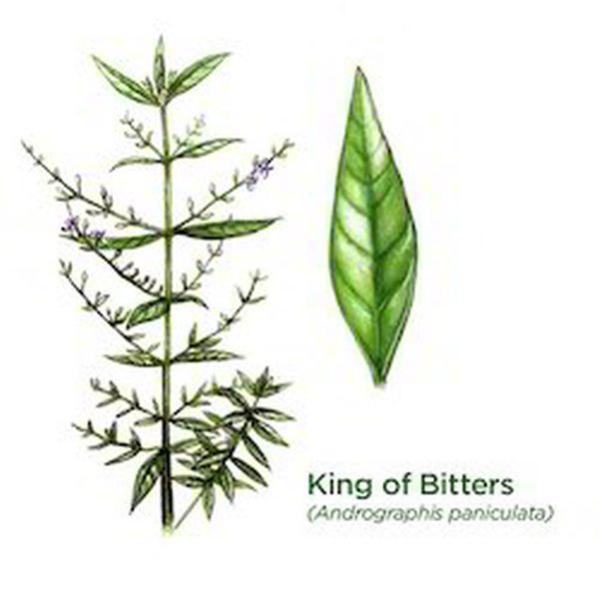Andrographis paniculata, commonly known as ‘king of bitters’, is an herb traditionally used in Ayurveda and Traditional Chinese Medicine.
Andrographis paniculata is used to treat the common cold. It is fairly effective when taken for three to five days after the symptoms first appear. However, there is limited human evidence for the effects of this herb, since research tends to focus on the combination therapy of Andrographis paniculata and Eleutherococcus senticosus, also known as Siberian ginseng, and not on Andrographis paniculata by itself.
Andrographis paniculata has also been studied for its anti-cancer effects. In vitro (outside the body) testing and animal research suggest that Andrographis paniculata has an anti-proliferative effect, meaning it is able to slow the spread of cancer cells. The herb does not appear to be able to induce cancer cell death, however.
The bioactive ingredients of Andrographis paniculata can be traced back to a single diterpene molecule called andrographolide.
According to Memorial Sloan-Kettering Cancer Center, the active ingredient in andrographis is andrographolides. Due to the andrographolides, andrographis has potent anti-inflammatory and antimalarial properties. It also has antimicrobial properties, meaning it can help to fight off and prevent infections from harmful microorganisms such as viruses, bacteria and fungi. In addition, andrographis is a powerful antioxidant and it can help to prevent free radical induced damage to your cells and DNA.
Scientists have discovered that andrographis helps to boost the immune system by stimulating the body’s production of antibodies and macrophages, which are large white blood cells that scavenge harmful microorganisms. It is taken for both the prevention and treatment of the common cold, and it is often referred to as Indian echinacea. It might help lessen the severity of cold symptoms such as sleeplessness, fever, nasal drainage and sore throat.
Andrographis may also help to prevent and treat cancer, and preliminary studies done in test tubes found that extracts of andrographis help to treat stomach, skin, prostate and breast cancer. Due to the herb’s antiviral properties, andrographis is used to treat herpes and it is also currently being studied as a treatment for Aids and HIV as well. Andrographis also promotes heart health and can help to prevent the formation of blood clots as well as to dissolve already formed blood clots. In addition, the herb relaxes smooth muscles in the walls of blood vessels and thereby helps to reduce high blood pressure.
Andrographis is used to promote gallbladder and digestive health. It also helps to support and strengthen the liver and it is used in combination with other herbs in several Ayurvedic formulations to treat liver disorders. Finally, andrographis extracts taken orally have been found to help neutralize the poisonous effects of snake venom.
The therapeutic dose of andrographis is 400 mg, twice daily, for up to 10 days. Although andrographis is considered safe in humans, the NYU Langone Medical Center warns that animal studies suggest that it may impair fertility. Andrographis may cause unwanted side effects such as headaches, fatigue, allergic reactions, nausea, diarrhea, altered taste and pain in the lymph nodes. It may also interact with certain medications and as with any supplement you should consult your health care practitioner before taking the herb.
Post time: Mar-19-2020
